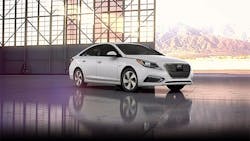S. Korea to Help Domestic Auto Companies Produce ‘Green’ Cars
As part of global efforts to cut carbon emissions and curb climate change, South Korea unveiled on Dec. 8 an ambitious plan to dramatically increase the production of environmentally friendly cars by 2020.
Under the policy goals released by the energy ministry, the annual output of "green cars" like hybrid and electric-powered vehicles would increase sharply from 80,000 this year to 920,000 over the next five years.
Seoul eventually hopes such vehicles would account for 20% of all cars sold in the domestic market, compared to the current share of just two percent.
The issue of vehicle emissions has taken on a higher public profile recently in South Korea as a result of the scandal involving Volkswagen and faked emissions standards. Last month, the environment ministry ordered the German automaker to recall 125,500 diesel vehicles sold here and fined the company more than $12 million.
The energy ministry said the new green car policy would help Seoul cut carbon emissions by 3.8 million tons over the next five years.
It vowed to invest 150 billion won (US$127 million) to help local carmakers like Hyundai (IW 1000/47) improve the range of battery-powered cars and eventually drive down prices.
Hundreds of new electric charging stations will be built across the nation -- with a target of 1,400 by 2020, compared to the current number of 400.
"Environmentally-friendly cars...will account for 50% of the global auto market by 2030," the ministry said.
South Korea has been slow in adopting green car technology, with consumers turned off by high prices and a lack of charging stations.
But Hyundai -- the South's largest automaker -- has been seeking to expand its presence in the global green car market that is currently dominated by Japan's Toyota.
Hyundai, which forms the world's fifth-largest carmaking group along with its smaller affiliate Kia, plans to triple its number of fuel-efficient car models to 22 over the next five years.
Copyright Agence France-Presse, 2015
About the Author
Agence France-Presse
Copyright Agence France-Presse, 2002-2025. AFP text, photos, graphics and logos shall not be reproduced, published, broadcast, rewritten for broadcast or publication or redistributed directly or indirectly in any medium. AFP shall not be held liable for any delays, inaccuracies, errors or omissions in any AFP content, or for any actions taken in consequence.
